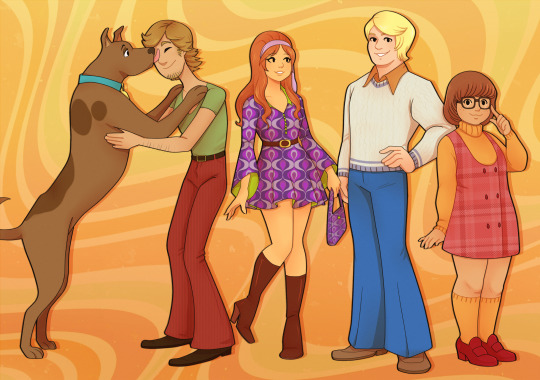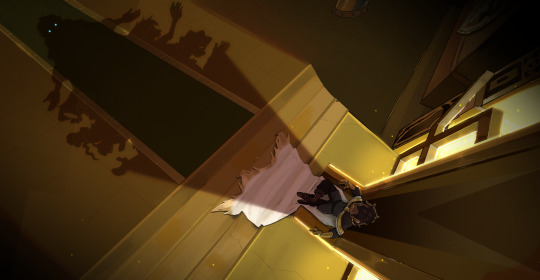Text
You really need to make non-tragic past for your characters, significant people and events that impacted their lives, non-dramatic mundane moments that shaped them, happy memories, bitter memories, embarrassing memories.
Like yes the space princess lost her whole civilization, but did she have friends before that? Favorite place? Does she miss the sound of her favorite music she use to listen to?
34K notes
·
View notes
Text
the "I'm not a drinker myself" to gradually becoming an alcoholic to numb out the pain pipeline
the "I don't want them to change me. turn me into something I'm not" to being turned into a mutt version of himself pipeline
the "I do everything in my power to protect my sister" to losing her anyway pipeline
17K notes
·
View notes
Text
Just a reminder that we don’t know all the good things Katniss does/did for her community, because Katniss wouldn’t tell us unless it was relevant to what was going on.
In Catching fire, she doesn’t tell us that she’s being going around and bringing food to poor children in the seam until she needs to explain why she had a bag of food and why her mother wouldn’t find that odd.

In the first book, when she’s telling Peeta about the story of how she got Prims goat, she refuses to admit that this wasn’t a selfish move so she could get money out of that goat. (You could also argue that this is her refusing to be vulnerable in front of Peeta and all of Pamen though. I think it’s both, because she doesn’t even admit that she did this purely for her sister in her internal dialogue.)

And in Mockingjay, she never tells us that she’s the one that got Haymitch the goose eggs to help him heal after the games. All she says in the epilogue is that Haymitch raises geese when the liquor runs out. And we would never know otherwise if Haymitch didn’t mention that SHE was the one who got him the geese in sotr.


12K notes
·
View notes
Text
please
How AI affects RP
Hello, everypony, I am working on a little project and trying to research how AI has affected the RP community. If you would like please take this survey 100% anonymous and I will use the results. Also, if you would like please reblog this post to get a wider reach that would be great. Thank you!
1 note
·
View note
Text
How AI affects RP
Hello, everypony, I am working on a little project and trying to research how AI has affected the RP community. If you would like please take this survey 100% anonymous and I will use the results. Also, if you would like please reblog this post to get a wider reach that would be great. Thank you!
1 note
·
View note
Text
"Don't use Libby because it costs libraries too much, pirate instead" is such a weird, anti-patron, anti-author take that somehow manages to also be anti-library, in my professional librarian-ass opinion.
It's well documented that pirating books negatively affects authors directly* in a way that pirating movies or TV shows doesn't affect actors or writers, so I will likely always be anti-book piracy unless there's absolutely, positively no other option (i.e. the book simply doesn't exist outside of online archives at all, or in a particular language).
Also, yeah, Libby and Hoopla licenses are really expensive, but libraries buy them SO THAT PATRONS CAN USE THEM. If you're gonna be pissed at anybody about this shitty state of affairs, be pissed at publishing companies and continue to use Libby or Hoopla at your library so we can continue to justify having it to our funding bodies.
One of the best ways to support your library having services you like is to USE THOSE SERVICES. Yes, even if they are expensive.
*Yes, this is a blog post, but it's a blog post filled with links to news articles. If you can click one link, you can click another.
73K notes
·
View notes
Text
Shabbat
sooo what are your characters up to on friday night?
244 notes
·
View notes
Text
I finished my Rome book and have now begun one about Pompeii. I’m 65 pages in and I already love it: yes, it covers the volcano, but most of the book is about “this is what the town and daily life of it would have been like, actually.” Fascinating stuff. Things I’ve learned so far:
- The streets in Pompeii have sidewalks sometimes a meter higher than the road, with stepping stones to hop across as “crosswalks.” I’d seen some photos before. The book points out that, duh, Pompeii had no underground drainage, was built on a fairly steep incline, and the roads were more or less drainage systems and water channels in the rain.
- Unlike today, where “dining out” is expensive and considered wasteful on a budget, most people in Pompeii straight up didn’t have kitchens. You had to eat out if you were poor; only the wealthy could afford to eat at home.
- Most importantly, and I can’t believe in all the pop culture of Pompeii this had never clicked for me: Pompeii had a population between 6-35,000 people. Perhaps 2,000 died in the volcano. Contemporary sources talk about the bay being full of fleeing ships. Most people got the hell out when the eruption started. The number who died are still a lot, and it’s still gruesome and morbid, but it’s not “an entire town and everyone in it.” This also makes it difficult for archeologists, apparently (and logically): those who remained weren’t acting “normally,” they were sheltering or fleeing a volcano. One famous example is a wealthy woman covered in jewelry found in the bedroom in the glaridator barracks. Scandal! She must have been having an affair and had it immortalized in ash! The book points out that 17 other people and several dogs were also crowded in that one small room: far more likely, they were all trying to shelter together. Another example: Houses are weirdly devoid of furniture, and archeologists find objects in odd places. (Gardening supplies in a formal dining room, for example.) But then you remember that there were several hours of people evacuating, packing their belongings, loading up carts and getting out… maybe the gardening supplies were brought to the dining room to be packed and abandoned, instead of some deeper esoteric meaning. The book argues that this all makes it much harder to get an accurate read on normal life in a Roman town, because while Pompeii is a brilliant snapshot, it’s actually a snapshot of a town undergoing major evacuation and disaster, not an average day.
- Oh, another great one. Outside of a random laundry place in Pompeii, someone painted a mural with two scenes. One of them referenced Virgil’s Aeneid. Underneath that scene, someone graffiti’d a reference to a famous line from that play, except tweaked it to be about laundry. This is really cool, the book points out, because it implies that a) literacy and education was high enough that one could paint a reference and have it recognized, and b) that someone else could recognize it and make a dumb play on words about it and c) the whole thing, again, means that there’s a certain amount of literacy and familiarity with “Roman pop culture” even among fairly normal people at the time.
33K notes
·
View notes
Text

Wanted to draw some 70's clothing and Scooby-Doo is relevant right now so...
2K notes
·
View notes
Text
An incomplete list of garment-related things that were invented earlier than you probably think they were:
The predecessor to the zipper was invented in the 1890s and the first recognizable zippers were invented in the 19-teens, first used on boots and other heavy-duty items.
Snap fasteners were first patented in 1885. Like, the buttons.
Hooks and eyes are old as balls. I mean it. There are records of them from the 1300s.
You may have noticed a pattern. You may have noticed, perhaps, the emphasis on fasteners. You may be wondering to yourself whether Pancake has A Point To Make.
And the answer is yes, and the point would be this: stop making your fantasy characters lace themselves into everything.
6K notes
·
View notes
Text

all RIGHT:
Why You're Writing Medieval (and Medieval-Coded) Women Wrong: A RANT
(Or, For the Love of God, People, Stop Pretending Victorian Style Gender Roles Applied to All of History)
This is a problem I see alllll over the place - I'll be reading a medieval-coded book and the women will be told they aren't allowed to fight or learn or work, that they are only supposed to get married, keep house and have babies, &c &c.
If I point this out ppl will be like "yes but there was misogyny back then! women were treated terribly!" and OK. Stop right there.
By & large, what we as a culture think of as misogyny & patriarchy is the expression prevalent in Victorian times - not medieval. (And NO, this is not me blaming Victorians for their theme park version of "medieval history". This is me blaming 21st century people for being ignorant & refusing to do their homework).
Yes, there was misogyny in medieval times, but 1) in many ways it was actually markedly less severe than Victorian misogyny, tyvm - and 2) it was of a quite different type. (Disclaimer: I am speaking specifically of Frankish, Western European medieval women rather than those in other parts of the world. This applies to a lesser extent in Byzantium and I am still learning about women in the medieval Islamic world.)
So, here are the 2 vital things to remember about women when writing medieval or medieval-coded societies
FIRST. Where in Victorian times the primary axes of prejudice were gender and race - so that a male labourer had more rights than a female of the higher classes, and a middle class white man would be treated with more respect than an African or Indian dignitary - In medieval times, the primary axis of prejudice was, overwhelmingly, class. Thus, Frankish crusader knights arguably felt more solidarity with their Muslim opponents of knightly status, than they did their own peasants. Faith and age were also medieval axes of prejudice - children and young people were exploited ruthlessly, sent into war or marriage at 15 (boys) or 12 (girls). Gender was less important.
What this meant was that a medieval woman could expect - indeed demand - to be treated more or less the same way the men of her class were. Where no ancient legal obstacle existed, such as Salic law, a king's daughter could and did expect to rule, even after marriage.
Women of the knightly class could & did arm & fight - something that required a MASSIVE outlay of money, which was obviously at their discretion & disposal. See: Sichelgaita, Isabel de Conches, the unnamed women fighting in armour as knights during the Third Crusade, as recorded by Muslim chroniclers.
Tolkien's Eowyn is a great example of this medieval attitude to class trumping race: complaining that she's being told not to fight, she stresses her class: "I am of the house of Eorl & not a serving woman". She claims her rights, not as a woman, but as a member of the warrior class and the ruling family. Similarly in Renaissance Venice a doge protested the practice which saw 80% of noble women locked into convents for life: if these had been men they would have been "born to command & govern the world". Their class ought to have exempted them from discrimination on the basis of sex.
So, tip #1 for writing medieval women: remember that their class always outweighed their gender. They might be subordinate to the men within their own class, but not to those below.
SECOND. Whereas Victorians saw women's highest calling as marriage & children - the "angel in the house" ennobling & improving their men on a spiritual but rarely practical level - Medievals by contrast prized virginity/celibacy above marriage, seeing it as a way for women to transcend their sex. Often as nuns, saints, mystics; sometimes as warriors, queens, & ladies; always as businesswomen & merchants, women could & did forge their own paths in life
When Elizabeth I claimed to have "the heart & stomach of a king" & adopted the persona of the virgin queen, this was the norm she appealed to. Women could do things; they just had to prove they were Not Like Other Girls. By Elizabeth's time things were already changing: it was the Reformation that switched the ideal to marriage, & the Enlightenment that divorced femininity from reason, aggression & public life.
For more on this topic, read Katherine Hager's article "Endowed With Manly Courage: Medieval Perceptions of Women in Combat" on women who transcended gender to occupy a liminal space as warrior/virgin/saint.
So, tip #2: remember that for medieval women, wife and mother wasn't the ideal, virgin saint was the ideal. By proving yourself "not like other girls" you could gain significant autonomy & freedom.
Finally a bonus tip: if writing about medieval women, be sure to read writing on women's issues from the time so as to understand the terms in which these women spoke about & defended their ambitions. Start with Christine de Pisan.
I learned all this doing the reading for WATCHERS OF OUTREMER, my series of historical fantasy novels set in the medieval crusader states, which were dominated by strong medieval women! Book 5, THE HOUSE OF MOURNING (forthcoming 2023) will focus, to a greater extent than any other novel I've ever yet read or written, on the experience of women during the crusades - as warriors, captives, and political leaders. I can't wait to share it with you all!
31K notes
·
View notes
Text
I always loved the great divide cause im cool
i think we were too harsh on “the great divide” aang just fucking lying was hilarious
906 notes
·
View notes




